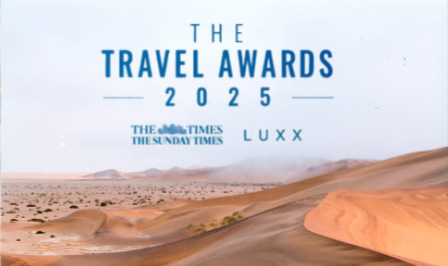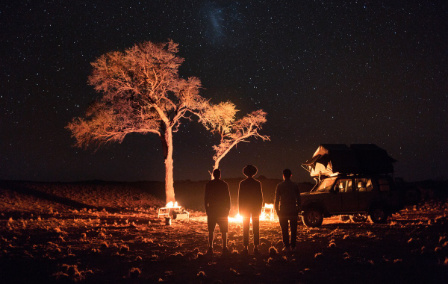Published 18th Aug. 2025
Reading time
A new pattern of travel planning is emerging. Gone are the days of the traditional two-to-three-month lead time – jet setters are now falling either side of the spontaneity spectrum. While last-minute bookings are booming, so are future trips as far away as 2030 (to catch the solar eclipse in Namibia, if you’re curious). We’ve dubbed this phenomenon the Concertina Effect, reflecting both the new stretched and squeezed booking windows. In short, the flexibility to plan ahead and be oh-so impulsive has never been more important. Read on to dive deeper into both sides and discover what’s driving these trends...
Sometimes it pays to think ahead. Popular seasonal phenomena like the Serengeti’s wildebeest migration, British Columbia’s salmon run and Japan’s cherry blossoms all call for precise planning, sometimes around 12 to 14 months in advance. It’s the same for nabbing the best seats, too. Dreaming of hopping aboard the train from Oslo to Trondheim? You won’t be the only one going rail-crazy, and spots atop these epic tracks fill up fast.
But better availability isn’t the only draw. Tom Barber, co-founder of Original Travel, explains that ‘in uncertain times, planning something joyful far ahead becomes an act of hope. We call it ‘anticication’ – looking forward to something extraordinary’. More than just a fun play on words, this effect can genuinely increase happiness levels in the months leading up to your trip. After all, there’s no time limit to bragging rights.

Image by Adobe Stock.
On the flip side, there’s been a substantial surge in spontaneous bookings. These are mainly for European gems like Italy, Norway and Greece, with many travellers enquiring and booking within days of departure. These spur-of-the-moment requests are usually driven by last-minute schedule gaps and the rise of remote working – and our experts are almost always able to accommodate.
However, Tom adds that there’s an emotional element to it, too: ‘In a world of burnout and bad news, travel becomes self-care. Clients tell us they simply need a change of scene, a bit of sun or space to breathe. These last-minute trips aren’t always tied to a milestone, but they’re no less meaningful’. This aligns with everything we believe in – that travel truly is good for the soul.

Image by Tomas Eidsvold / Unsplash.
Written by Evie Buller | Header Image by Grant Harder.
Practical advice and inspiration for your next trip

Screens can easily overshadow the travel experience. If that sounds familiar to you, don’t worry – this guide offers over 20 practical ways to unplug, from swapping devices for activities to picking a destination where connectivity naturally fades into the background. Reclaim your attention, strengthen in-person experiences and discover how much more rewarding travel can be without constant digital distractions.
13th November 2025 - Travel Trends

Last week, we were delighted to learn that we have been nominated for the ‘Best Luxury Tour Operators’ category in The Times and Sunday Times Travel Awards 2025. While we’re honoured to have been nominated for the fourth year on the trot, it would be fantastic to come out on top this year: so, if we’ve had the pleasure of crafting an unforgettable holiday for you, we’d love it if you would vote for us.
5th August 2025 - Travel Trends

Calling all night owls – the late shift just got a whole lot more interesting. Dubbed ‘Noctourism’, this new nocturnal travel trend is all about exploring destinations beyond their cocktail bars and casinos. From stargazing in Spain to night hikes in the Costa Rican jungle, there’s a whole world to discover after the lights go out. Torches at the ready? Let’s hope you’re not afraid of the dark... Stargazing in Spain Jungle hiking in Costa Rica Night safari in Botswana Bioluminescence in Cambodia Petra by candlelight Stargazing in Spain Thanks to light pollution in urban areas,
5th June 2025 - Travel Trends

Our team of destination experts will get to know you and your unique requirements for your holiday

We work with you to build an ultra-personalised holiday itinerary with your choice of accommodation, experiences and activities

All of our holidays include little extras designed to make a big difference to your trip, from fast-tracking you through airport check-in and security to our network of local Concierges